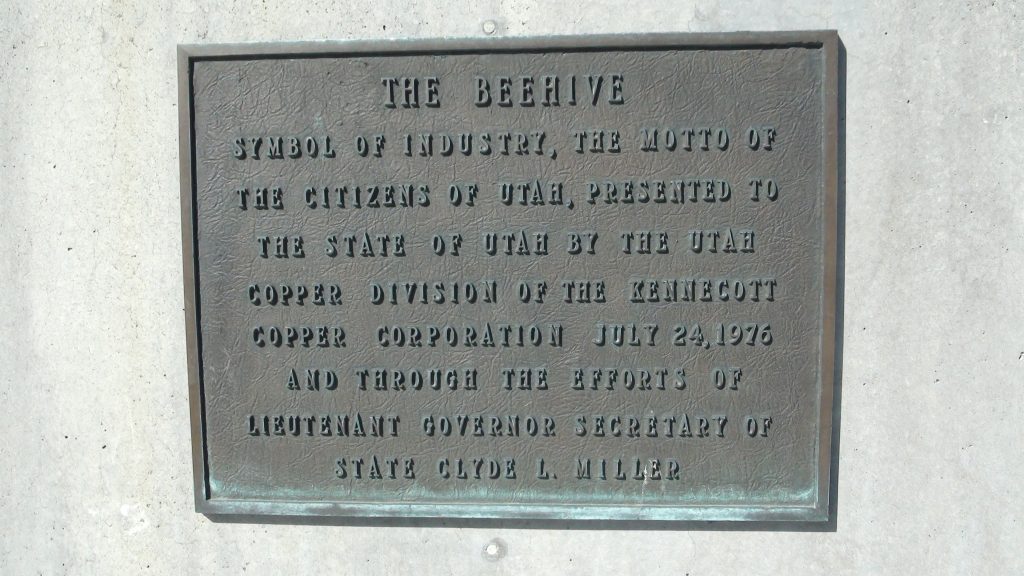Utah, the Beehive State
Saturday, 22 October 202
“I was in the city of Joppa praying; and in a trance I saw a vision, an object descending like a great sheet, let down from heaven by four corners; and it came to me. Acts 11:5
Note: You can listen to today’s commentary courtesy of our friends at “Bible in Ten” podcast. (Click Here to listen)
You can also read this commentary, with music, courtesy of our friends at “Discern the Bible” on YouTube. (Click Here to listen), or at Rumble (Click Here to listen).
In the previous verse, it noted that Peter began his response to the circumcision, putting everything in order as it occurred. That order now starts with, “I was in the city of Joppa praying.”
Peter begins with his location. As it was in a different city than where Cornelius was, it is important that he conveyed this to his audience. In this, they would be able to see that what occurred was based on events that actually took place more than a day apart in order for the immediate events surrounding Peter to occur simultaneously. While in Joppa, he next notes his state, saying, “and in a trance I saw a vision.”
The words are explanatory. Luke recorded what Peter saw as a trance without using the term “vision.” That is seen in Acts 10 –
The next day, as they went on their journey and drew near the city, Peter went up on the housetop to pray, about the sixth hour. 10 Then he became very hungry and wanted to eat; but while they made ready, he fell into a trance 11 and saw heaven opened and an object like a great sheet bound at the four corners, descending to him and let down to the earth. 12 In it were all kinds of four-footed animals of the earth, wild beasts, creeping things, and birds of the air. 13 And a voice came to him, “Rise, Peter; kill and eat.”
14 But Peter said, “Not so, Lord! For I have never eaten anything common or unclean.”
15 And a voice spoke to him again the second time, “What God has cleansed you must not call common.” 16 This was done three times. And the object was taken up into heaven again. Acts 10: 9-16
It is while in a trance and seeing the vision that Peter next explains the contents of the vision, saying, “an object descending like a great sheet.”
One can refer to the comments on Acts 10:11 to understand the meaning of this and to see that what Peter saw was probably a “great sail.” Translating the Greek word as “sail” is acceptable, and it is the most likely meaning of Peter’s words. Next, Peter says this great object was “let down from heaven by four corners.”
The Greek has two slight differences. First, the verb is a present participle, “being let down.” Secondly, it says, “from the heaven.” With that noted, the words of this clause are again explained in the Acts 10:11 commentary. There is rich symbolism and Peter would have grasped its intent after pondering what he saw. The verse next ends with, “and it came to me.”
It does not specifically say this in Acts 10, but it is implied. Peter is on the earth, the great object descended from the heaven, it was intended for him to see, and the voice that spoke was directed to him. Hence to say “and it came to me” is correct from his perspective.
Life application: The personal witness of an individual to the changing power of events in one’s life can lead others to follow the same path as well. In the case of accepting Jesus because of the gospel, there is no need to embellish the events that took place at all.
The focus is to be on the power of God, not on the individual. Unfortunately, humans find it satisfying to make events about us. This is not a healthy way of presenting why we have received Jesus. First, it is not the point of salvation. The ultimate point of salvation is for God to receive the glory.
Secondly, we are fallen beings and we are bound to fail. When we do, those who were impressed with the change in us might become disheartened in their seeking out the reason for our conversion. But if we keep the focus of our conversion on Jesus at all times, then our failings will not diminish the power of God in our lives, they will actually highlight it.
If we needed a Savior, and if we continue to need a Savior, it means that we are dependent on the Lord at all times. If we act as if our salvation has brought us to a state where we are no longer in need of Jesus’ guiding hand in our lives, we will not be bringing the glory to Him as we should.
Let us keep our personal testimony about Jesus focusing on Him at all times. As Paul says, “Therefore let him who thinks he stands take heed lest he fall” 1 Corinthians 10:12. We are always dependent on Jesus. Let our speech and attitude reflect this.
Lord God, how good You are to us. You saved us and You keep on saving us. When we fail You, there is always the assurance that we are Yours and that You are there to forgive us and lead us back to Yourself. And so, Lord, help us to consider this and draw near to You at all times. Thank You for Your tender care of us. Amen.

